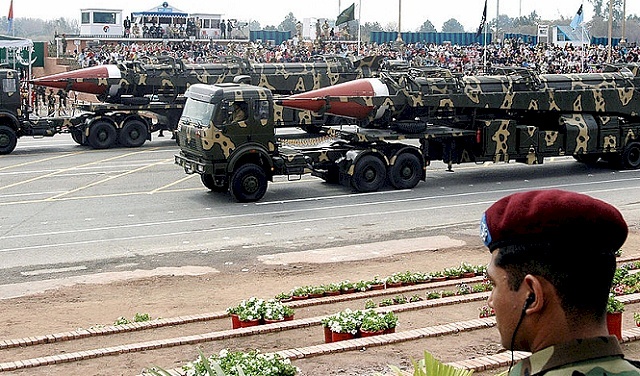
Top News
Saudi-Pakistani Defense Agreement Establishes Nuclear Umbrella, Altering Security Dynamics in the Region
SadaNews - The strategic defense agreement between Saudi Arabia and Pakistan, signed by both sides on Wednesday, places Islamabad and its nuclear umbrella at the heart of the security equation in the Middle East.
Few details about the agreement have been disclosed, and Pakistan's declared nuclear doctrine states that its weapons are only directed against its arch-rival India.
Riyadh hinted that it would effectively possess a nuclear shield under the agreement, while analysts suggest that Israel, the only nuclear state in the Middle East, will monitor the situation closely.
Pakistan’s Defense Minister Khawaja Muhammad Asif stated that nuclear weapons are "not on the radar" of the agreement. He said that the agreement could extend to include other Gulf countries.
Asif added, "We have no intention of using this agreement for any aggression, but if both parties are threatened, it is clear that this arrangement will come into effect."
Riyadh may view the nuclear issue from a different perspective. Gulf states have indicated that Israel has shown itself to be a direct threat after its unprecedented aggression against Qatar last week. Saudi Arabia also stated that if Iran obtains nuclear weapons, it will follow suit.
In response to a question about whether Pakistan would now be obligated to provide Saudi Arabia with a nuclear umbrella, a senior Saudi official said, "This is a comprehensive defense agreement that includes all military means."
Analysts noted that the agreement also reflects a diminishing trust in the security provided by the United States in the region.
Hassan Hassan, a researcher at the International Institute for Strategic Studies in London, pointed out that "from Saudi Arabia's perspective, the aim of the agreement is to fill the gap in strategic and conventional deterrence against nuclear-armed Israel."
A statement from Saudi Arabia indicated that the agreement "aims to develop aspects of defense cooperation between the two countries and enhance mutual deterrence against any aggression." The Saudi government's communication center has not yet responded to a request for comment on whether Pakistan's nuclear weapons are included in the agreement.
Officials from the foreign policy sectors in Washington and Israel have also not yet responded to requests for comments. The agreement may also raise concerns in India and Iran.
Pakistan is the only Muslim-majority country with nuclear weapons and is one of Asia's poorest countries, yet it has an army of over 600,000 soldiers to defend itself against its far larger rival India, with which it has fought three major wars, alongside multiple skirmishes, including a four-day conflict in May, which was the fiercest fighting between them in decades.
Wednesday's announcement did not reference nuclear weapons or any payments to Pakistan. Pakistan stated that "the agreement stipulates that any aggression against either country is considered aggression against both."
Pakistan’s Prime Minister Shahbaz Sharif thanked Saudi Crown Prince Mohammed bin Salman yesterday in a statement for his "great interest in expanding Saudi investments and trade and economic relations."
India and Pakistan began acquiring nuclear weapons in the late 1990s, with Pakistan developing missiles that can strike deep into India. However, should these missiles be directed the other way, Pakistan’s longer-range missiles could theoretically strike Israel.
Former military official Adil Sultan, who worked in Pakistan's strategic plans division overseeing the nuclear arsenal, stated that Pakistan’s missiles are capable of targeting the vast territory of India.
Sultan, who currently serves as the dean of the Space and Strategic Studies College at Islamabad Air University, said, "Israel has never been comfortable with Pakistan's nuclear weapons. However, this capability is very modest and is intended only for India."
Last year, a senior White House official stated that Pakistan was developing long-range ballistic missile capabilities that could ultimately allow it to strike targets far beyond South Asia. Islamabad denied this.
Abdulaziz Saqr, head of the Gulf Research Center in Saudi Arabia, stated that it is too early to draw conclusions about any nuclear element. He added, "The developments have highlighted the limits of relying solely on external protection, particularly from the United States."
Former President Donald Trump hoped to expand the "Abraham Accords" and establish diplomatic relations between Israel and Arab countries, including Saudi Arabia, during his second term. However, Riyadh has made it clear that it will not establish relations with Israel until the war on Gaza ends and space is provided for the establishment of a Palestinian state.
Pakistan has always had a small military presence in Saudi Arabia, but this week's agreement indicates a much larger involvement.
Former Pakistani Ambassador to the United States, Maleeha Lodhi, stated that "for Pakistan, its influence in the Middle East is significant, yet it is stepping its foot into a troubled region."
Former chairman of the defense committee in Pakistan's Senate, Mushahid Hussain, noted that the Pakistani approach has always focused on Muslim countries from the outset. He added, "Pakistan has military capability, and in return, what we gain is economic enhancement. Pakistan is the strategic new choice for these Gulf countries."
Pakistan is facing tough competition with India's defense budget, which is at least seven times larger, meaning that any influx of new Saudi funds could create some balance. Saudi Arabia has financially supported Islamabad for decades, with the latest being a three-billion-dollar loan.
India announced yesterday that it intends to "study the implications of this development on our national security, as well as on regional and global stability."
Read Also

Naim Qassem: Diplomatic Path Has Failed and We Adhere to Weapons

Spain Will Cooperate.. White House: The Regime in Iran Is Being 'Crushed' and There Are No...

Why Has China Not Actively Supported Its Ally Iran?

Israel Talks About Coordination Between Hezbollah and Iran to Carry Out Attacks and Fears...

Fears in the Pentagon: Rapid Consumption of Advanced US Munitions in the War on Iran

Israeli Army Bombs Huge Military Complex in Tehran

Israeli Estimates: Why is Iran Focusing Its Strikes on the Gulf?

